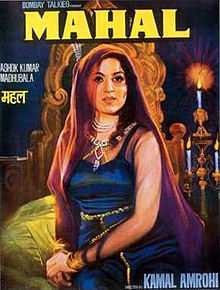Mahal (1949 film)
| Mahal | |
|---|---|
 Film poster | |
| Directed by | Kamal Amrohi |
| Produced by |
Ashok Kumar Savak Vacha |
| Written by | Kamal Amrohi |
| Starring |
Ashok Kumar Madhubala |
| Music by | Khemchand Prakash |
| Cinematography | Josef Wirsching |
| Edited by |
Bimal Roy M. Shanker R. M. Tipnis |
Release dates | 1949 |
Running time | 165 min. |
| Country | India |
| Language | Hindi / Urdu |
| Box office | 1 cr |
Mahal (Hindi: महल; Urdu: محل; English translation: The Mansion) is a 1949 Indian Hindi film directed by Kamal Amrohi and starring Ashok Kumar and Madhubala. It was India's first reincarnation thriller film.[1]
Produced by Bombay Talkies studio, this Kamal Amrohi's directorial debut launched both playback singer Lata Mangeshkar and the leading lady Madhubala into super-stardom.[2][3] Its songs, particularly "Aayega Aane Waala" sung by Lata Mangeshkar, are perennial favorites. Rajkumari sang two other well-known songs from the film, "Mein woh dulhan hon" and "Yeh raat phir na aayge". Their lyrics were written by Nakshab. Rajkumari also sang these songs live on a Channel 4 (a UK TV station) programme called 'Mahfil' aired on 24 March 1991.
Mahal made Lata Mangeshkar famous and established playback singers as stars in their own right. Before Mahal, records listed character names and indeed the first batch of records credited “Aayega aane wala” to Kamini, the character played by Madhubala. When the song first played on All India Radio, its phone lines were flooded with callers inquiring the singer's name. All India Radio had to find this out from the record company before it could announce Lata Mangeshkar's name on the air.[4]
Theme
The movie was a groundbreaking supernatural suspense thriller and one of the earliest known films dealing with reincarnation. Mahal became one of the biggest box office hits of 1949 in India [5] and paved way for Indian gothic fiction.[6]
Cast
Many established actresses and new faces were screen-tested for the coveted female lead. The part was written with the then-reigning superstar, Suraiya in mind. However after two screen tests, the fledgling Madhubala, only 16 at the time was selected. The film was key in defining her screen persona and establishing her as one of the most successful and illustrious actresses of the 1950s.
- Ashok Kumar as Hari Shankar
- Madhubala as Kamini
- M. Kumar as Hari Shankar's Father
- Vijayalaxmi as Ranjana
- Kanu Roy as Shrinath
- S. Nazir
- Eruch Tarapore
- Sheela Naik
- Leela Pandey
- Neelam
- Kaneez
- Jagannath
- Mohsin
- Laxman Rao
- S.A. Baker
- Ramastri
- Raja Salim
Soundtrack
For lyrics written by Nakshab, the music of the songs was composed by Khemchand Prakash.
- "Aayega Aanewala" - Singer: Lata Mangeshkar
- "Chun Chun Gunguruva Baje Jhumba" - Singers: Rajkumari, Zohrabai Ambalawali
- "Ghabrekar Ke Jo Hum Sir Ko Takraayan" - Singer: Rajkumari
- "Dil Ne Fir Yaad Kiya" - Singer: Lata Mangeshkar
- "Main Wo Hansi Hun Lab Pe Jo Aane Se Rah Gayi" - Singer: Rajkumari
- "Ek Teer Chala Dil Pe Laga" - Singer: Rajkumari
- "Mushkil Hai Bahot Mushkil" - Singer: Lata Mangeshkar
Influence
Bimal Roy, who was the editor for Mahal, would later go on to direct Madhumati,[6] which itself went on to become the source of inspiration for many later works dealing with the theme of reincarnation in Indian cinema, Indian television, and perhaps world cinema. It may have been the source of inspiration for the American film The Reincarnation of Peter Proud (1975) and the Hindi film Karz (1980), both of which dealt with reincarnation and have been influential in their respective cultures.[7] Karz in particular was remade several times: as the Kannada film Yuga Purusha (1989), the Tamil film Enakkul Oruvan (1984), and Om Shanti Om [8][9]
References
- ↑ "Palace Of Delusion:Kamal Amrohi’s Mahal is our first reincarnation thriller". Outlook (magazine). Jun 4, 2012. Archived from the original on 3 July 2014.
- ↑ Roshmila Bhattacharya (May 6, 2013). "Testing times for Madhubala". Pune Mirror. Retrieved May 10, 2013.
- ↑ Sidharth Bhatia (May 4, 2013). "Kamal Amrohi Producer Kamal Amrohi was the master of old-world elegance and heartache". Mint. Retrieved May 10, 2013.
- ↑ "Birth Centenaries" (PDF). pib.nic.in. Press Information Bureau. p. 3. Retrieved 25 December 2011.
- ↑ Mahal (1949) Classic Films at upperstall
- ↑ 6.0 6.1 Mishra, Vijay (2002), Bollywood cinema: temples of desire, Routledge, pp. 49–57, ISBN 0-415-93014-6
- ↑ Doniger, Wendy (2005), "Chapter 6: Reincarnation", The woman who pretended to be who she was: myths of self-imitation, Oxford University Press, pp. 112–136 [135], ISBN 0-19-516016-9
- ↑ Ashanti nags Om Shanti Om Mumbai Mirror, 7 August 2008.
- ↑ Shah Rukh, Farah Sued: Writer Claims SRK stole his script for Om Shanti Om
External links
- Mahal at the Internet Movie Database